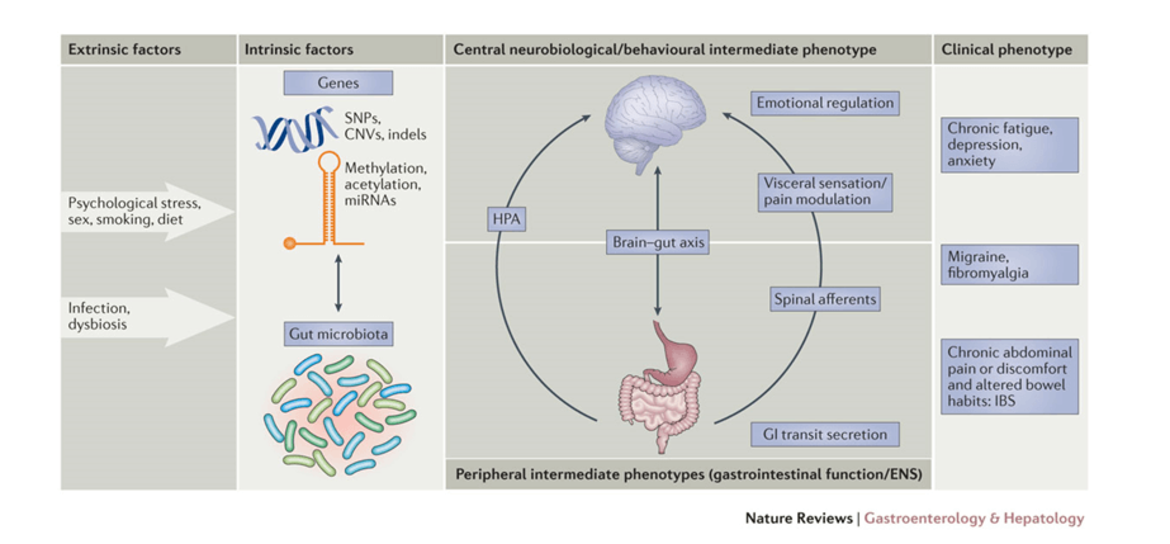Genetics of Irritable Bowel Syndrome
Irritable Bowel Syndrome (IBS) is a chronic gastrointestinal disorder, lately coined as gut-brain disorder. Patients present high comorbidity of mental (anxiety, depressive) and somatic conditions (migraine, fibromyalgia). Besides genetic factors, the crucial role of environmental factors in the pathoaetiology of IBS and comorbid conditions is well established (Figure 1, Gazouli et al., 2016; Enck et al., 2016). The interplay between the environment and the genetic background shaping the individual epigenetics of a patient has only been poorly addressed to date. Intensive networking during the last years (German IBS-Net, GENIEUR, DISCOvERIE), enabled us to establish a research environment, in which these factors will be assessed in a harmonised manner and complementarily analysed on pan-European level in a multidisciplinary team in that we focus on the genetics and epigenetics of IBS.

German IBS-Net
In 2010, we established the German IBSNet, in which specialized centres from all over Germany collect IBS samples to unravel genetic causes of IBS.

With the support of the COST programme (Cooperation in Science and Technology), we established in 2011the COST Action BM1106 GENIEUR (The Genes in Irritable Bowel Syndrome Research Network Europe, www.GENIEUR.eu). The major goal of GENIEUR comprised the definition of a harmonised patient and control recruitment scheme as well as the establishment of a European biobank to investigate factors contributing to IBS on different levels (genomics, epigenomics, microbiomics, metagenomics). Our long term goal, is to dissect the molecular pathogenesis of IBS and its comorbidities as well as the establishment of an evidence-based diagnostics and therapeutics (Kapeller et al., 2008; Kilpatrick et al., 2011; Ek et al., 2014; Orand et al., 2015; Czogalla et al., 2015; Gazouli et al., 2016; Martinez et al., 2016; Wohlfarth, Schmitteckert et al., 2017; Martinez et al., 2020; Konturek et al., 2021).

Most recently, the H2020 consortium DISCOvERIE - Development, dIagnosis and prevention of gender-related Somatic and mental COmorbiditiEs in iRritable Bowel Syndrome In Europe (www.discoverie.eu) kicked-off. DISCOvERIE aspires to advance in the understanding of causative mechanisms of most frequent and demanding mental and somatic comorbid conditions affecting IBS, by focusing on microbiome, intestinal permeability, central nervous system processing, neuroinflammation and specific genomic/epigenomic marks to define patient subgroups for improved diagnostics and therapy.
FURTHER INFORMATION
The Genes in Irritable Bowel Syndrome Research Network Europe (GENIEUR)
European Society of Neurogastroenterology and Motility
Deutsche Gesellschaft für Neurogastroenterologie und Motilität e.V.
Deutsche Gesellschaft für Verdauungs- und Stoffwechselkrankheiten
OUR COLLABORATORS
Reizdarmsprechstunde Uniklinikum Heidelberg
Bergen, Norway Giardiasis Research Group
VHIR, Barcelona, Spain: Physiology and Pathophysiology of the Digestive Tract
Belly Genes Group Karolinska Institute Stockholm, Sweden
UCLA, Los Angeles, CA, USA Gail and Gerald Oppenheimer Family Center for Neurobiology of Stress
University of Gothenburg, Sweden
FUNDING BODIES
back to Genetics of Neurogastroenterologic Disorders (AG Niesler)
![[Translate to English:] [Translate to English:]](/fileadmin/_processed_/8/2/csm_20131204_Beratung_035_a396c6c6e5.jpg)
![[Translate to English:] [Translate to English:]](/fileadmin/_processed_/a/0/csm_20170627_PflegeOrtho_001_fb912471fa.jpg)
![[Translate to English:] [Translate to English:]](/fileadmin/_processed_/f/c/csm_20170215_LaborOMZ_155_c0169c0898.jpg)
![[Translate to English:] [Translate to English:]](/fileadmin/_processed_/2/c/csm_20180523_Labor_139_6ebb9a0a1b.jpg)
